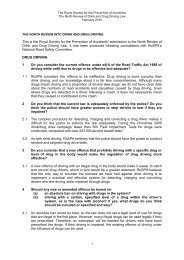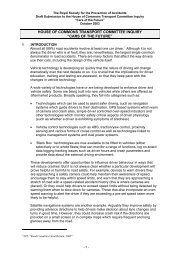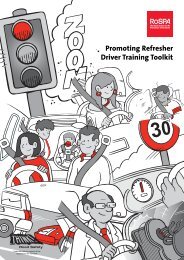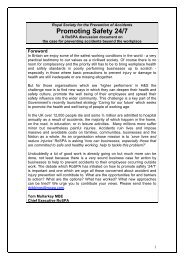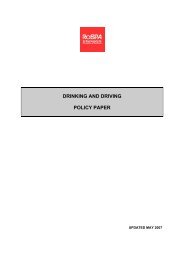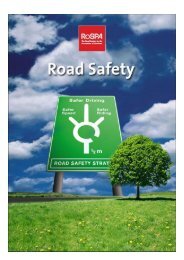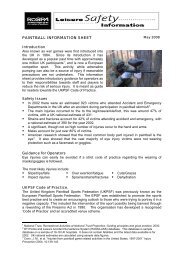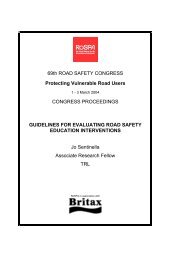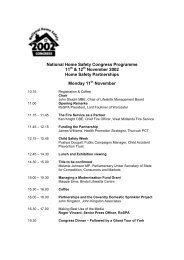RoSPA Young Drivers at Work Report
RoSPA Young Drivers at Work Report
RoSPA Young Drivers at Work Report
Create successful ePaper yourself
Turn your PDF publications into a flip-book with our unique Google optimized e-Paper software.
Chapter 8<br />
Overarching themes<br />
Within the qualit<strong>at</strong>ive responses to this research a number<br />
of overarching themes can be identified.<br />
8.1 Gradu<strong>at</strong>ion<br />
“I think you should have been told: Look, this is the<br />
start of everything, keep your eyes open you’re just<br />
about to start learning. ”<br />
(Focus group 2 member)<br />
Wh<strong>at</strong> is the aim of the current system of training<br />
and testing?<br />
90% of respondents reported th<strong>at</strong> they felt the current<br />
system of driver training and testing was inadequ<strong>at</strong>e in<br />
preparing new drivers to drive for work.<br />
Respondents expressed the opinion th<strong>at</strong> the ‘L’ test does<br />
not produce fully trained or competent drivers.While it<br />
legally qualified individuals to drive, respondents reported<br />
th<strong>at</strong> employers on the whole were not taking the test to<br />
be proof of any more than th<strong>at</strong>. They were not making the<br />
assumption th<strong>at</strong> because somebody has passed their test,<br />
they are safe to drive.<br />
This feeling was supported by the fact th<strong>at</strong> many<br />
employers conducted their own assessments and deliver<br />
their own training for young drivers.<br />
Respondents also reported th<strong>at</strong> when recruiting agency<br />
staff, they had particular difficulty in finding workers who<br />
not only were qualified, but also confident and skilled<br />
enough to meet all their driving requirements:<br />
“All it’s doing is getting people past their test. I don’t<br />
believe the road test as it is and the theory test, is<br />
adequ<strong>at</strong>e enough. The test doesn’t prepare them<br />
for driving <strong>at</strong> work. ”<br />
(Company Director, telephone interviewee)<br />
“I don’t think it’s very good, it’s just like a basic<br />
sort of competence test and after th<strong>at</strong>, then they<br />
move on. ”<br />
(Health and Safety Manager, telephone interviewee)<br />
“I don’t think the current training as in the driving<br />
test, even with the new form<strong>at</strong> of driving test,<br />
is even considering driving for work <strong>at</strong> all. It’s just<br />
really assessing whether a person is rel<strong>at</strong>ively safe<br />
to go on the road and I say rel<strong>at</strong>ively. ”<br />
(Facilities Manager, telephone interviewee)<br />
The overwhelming response was th<strong>at</strong> the ‘L’ test equ<strong>at</strong>es<br />
to a basic level of driving ability. The majority of employer<br />
respondents regarded the ‘L’ test as the first stage in a<br />
driving career:<br />
“…he is now legally qualified but he is not<br />
competent. Experience and <strong>at</strong>titude are not tested,<br />
th<strong>at</strong> is the thing: it is about getting towards a<br />
competent driver. ”<br />
(Safety and Services Manager, telephone interviewee,<br />
speaking about a young driver)<br />
On the other hand some respondents believed the ‘L’ test<br />
meant they were fully equipped – the had ‘passed’; there<br />
was no appreci<strong>at</strong>ion of life-long learning or advancement,<br />
and further training was not required:<br />
“You’ve passed your test so why keep<br />
getting tested? ”<br />
(Focus group 5 member)<br />
“If they’ve passed their driving test, they’ve passed<br />
their driving test. ”<br />
(Utilities Manager, telephone interviewee)<br />
This lack of perception of ‘need’ was an often reported<br />
stumbling block with employer respondents in rel<strong>at</strong>ion to<br />
resistance from staff. Respondents suggested th<strong>at</strong> asking<br />
somebody to take further training would be seen as<br />
“stigma”; not as a means of progression or development<br />
but as a means of correcting poor driving ability.<br />
Respondents indic<strong>at</strong>ed th<strong>at</strong> they would get a ‘why me’<br />
response if they suggested somebody need to take<br />
further training.<br />
This perception of further training being a tre<strong>at</strong>ment<br />
r<strong>at</strong>her than a preventive measure was shared by some of<br />
the young driver respondents we spoke to:<br />
“Interviewer:Wh<strong>at</strong> would make a post-test<br />
qualific<strong>at</strong>ion relevant? ”<br />
“R1: If it was made mand<strong>at</strong>ory or if I personally felt I<br />
needed to go on a driving course say if I kept<br />
crashing or doing something wrong. ”<br />
(Focus group 2 member)<br />
Post-test training<br />
“They could have passed their test in a mini! ”<br />
(Local Authority Controller, telephone interviewee)<br />
Respondents described the current ‘L’ test as a starting<br />
point; a g<strong>at</strong>eway to advanced training.<br />
28 <strong>Young</strong> <strong>Drivers</strong> <strong>at</strong> <strong>Work</strong> <strong>Report</strong>



